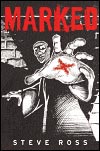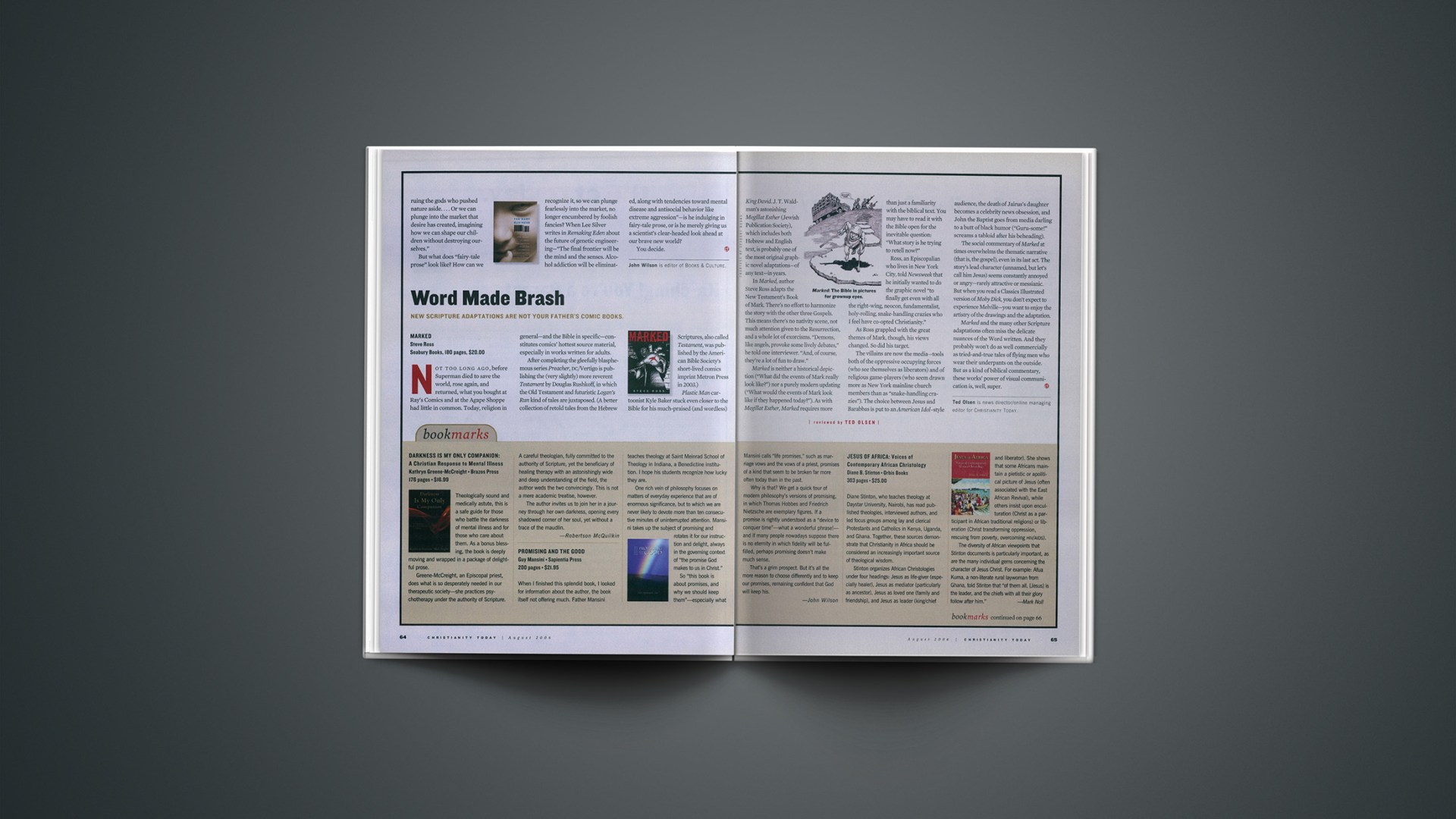Not too long ago, before Superman died to save the world, rose again, and returned, what you bought at Ray’s Comics and at the Agape Shoppe had little in common. Today, religion in general—and the Bible in specific—constitutes comics’ hottest source material, especially in works written for adults.
 Markedby Steve RossSeabury Books180 pp.; $20.00 |
After completing the gleefully blasphemous series Preacher, DC/Vertigo is publishing the (very slightly) more reverent Testament by Douglas Rushkoff, in which the Old Testament and futuristic Logan’s Run kind of tales are juxtaposed. (A better collection of retold tales from the Hebrew Scriptures, also called Testament, was published by the American Bible Society’s short-lived comics imprint Metron Press in 2003.)
Plastic Man cartoonist Kyle Baker stuck even closer to the Bible for his much-praised (and wordless) King David. J. T. Waldman’s astonishing Megillat Esther (Jewish Publication Society), which includes both Hebrew and English text, is probably one of the most original graphic novel adaptations—of any text—in years.
In Marked, author Steve Ross adapts the New Testament’s Book of Mark. There’s no effort to harmonize the story with the other three Gospels. This means there’s no nativity scene, not much attention given to the Resurrection, and a whole lot of exorcisms. “Demons, like angels, provoke some lively debates,” he told one interviewer. “And, of course, they’re a lot of fun to draw.”
Marked is neither a historical depiction (“What did the events of Mark really look like?”) nor a purely modern updating (“What would the events of Mark look like if they happened today?”). As with Megillat Esther, Marked requires more than just a familiarity with the biblical text. You may have to read it with the Bible open for the inevitable question: “What story is he trying to retell now?”
Ross, an Episcopalian who lives in New York City, told Newsweek that he initially wanted to do the graphic novel “to finally get even with all the right-wing, neocon, fundamentalist, holy-rolling, snake-handling crazies who I feel have co-opted Christianity.”
As Ross grappled with the great themes of Mark, though, his views changed. So did his target.
The villains are now the media—tools both of the oppressive occupying forces (who see themselves as liberators) and of religious game-players (who seem drawn more as New York mainline church members than as “snake-handling crazies”). The choice between Jesus and Barabbas is put to an American Idol–style audience, the death of Jairus’s daughter becomes a celebrity news obsession, and John the Baptist goes from media darling to a butt of black humor (“Guru-some!” screams a tabloid after his beheading).
The social commentary of Marked at times overwhelms the thematic narrative (that is, the gospel), even in its last act. The story’s lead character (unnamed, but let’s call him Jesus) seems constantly annoyed or angry—rarely attractive or messianic. But when you read a Classics Illustrated version of Moby Dick, you don’t expect to experience Melville—you want to enjoy the artistry of the drawings and the adaptation.
Marked and the many other Scripture adaptations often miss the delicate nuances of the Word written. And they probably won’t do as well commercially as tried-and-true tales of flying men who wear their underpants on the outside. But as a kind of biblical commentary, these works’ power of visual communication is, well, super.
Ted Olsen is news director/online managing editor for Christianity Today.
Copyright © 2006 Christianity Today. Click for reprint information.
Related Elsewhere:
Marked and Megillat Esther have their own sites.
Today’s Christian, a Christianity Today sister publication, covered the publication of Metron Press’s Testament.
The Preacher series, beginning with Volume 1, Testament, King David, Megillat Esther, and Marked are available from Amazon.com and other book retailers.
One book that didn’t get mentioned in this article for space reasons is the Lion Graphic Bible, which is much more adult than The Picture Bible .
Comic Book Resources has more information about the Vertigo Testament title.
The Associated Press and Orlando Sentinel have recently looked at Christian comics.
Christian Comics International has much on the history of comics based on the Bible.










